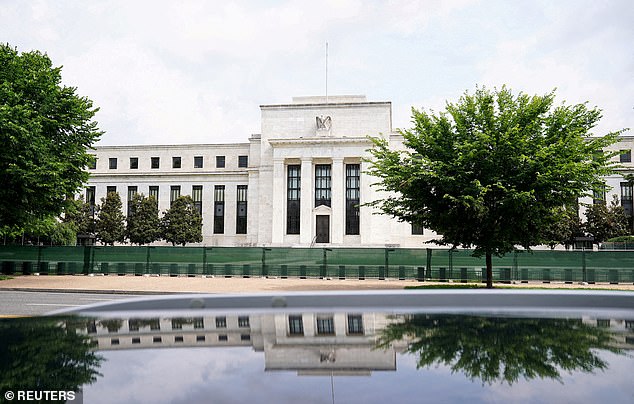[ad_1]
All sessions of the US Federal Reserve’s interest rate setting open markets committee have Wall Street and the world on tenterhooks. The decision tomorrow is of particular significance.
After months of agitation, President Trump, during his State Visit to Britain, will get his wish with an expected quarter-of-a-percentage point reduction in the federal funds rate range of 4.25 per cent to 4.5 per cent.
Fed chairman Jay Powell is navigating a complex background. America’s jobs market is weakening but consumer price inflation, at 2.9 per cent, is above target.
In contrast to the Bank of England, the Fed has a dual mandate to steer between jobs and inflation. Britain’s key bank rate often follows the Fed’s lead.
That is highly unlikely at this week’s gathering of Bank rate setters with inflation running at 3.8 per cent – almost twice the target.
Bank watchers will be focused on whether it pauses or cuts back on its sale of gilts holdings, known as quantitative tightening.

Rate expectations: The US Federal Reserve (pictured) is widely expected to cut interest rates by a quarter-of-a-percentage point from their current range of 4.25% to 4.5%.
Powell at the Fed has been under relentless pressure from Trump for months.
The President has described him as a ‘stupid person’, criticised a pricey $3billion refurbishment of the Fed’s dysfunctional headquarters and launched an effort to pack the central bank with people of like mind.
Trump wants to oust governor Lisa Cook, alleging she breached mortgage rules. Her tenure is in the hands of the Supreme Court.
In addition, the President is challenging separation of powers by nominating top economic adviser Stephen Miran for a vacant seat.
This would allow him to take leave of absence as chairman of the Council of Economic Advisers. Both disputes are seen as blurring Fed independence and a risk to global financial stability.
A Fed rate cut, when equity markets and the value of tech stocks are racing away, could fuel output and share prices. Values of the ‘Mag Seven’, the S&P 500 and the Nasdaq tech market are hitting new highs almost daily.
Fear of what former Fed chairman Alan Greenspan described as ‘irrational exuberance’, or simply a bubble, is building.
Ringing change
The arrival of Indian contingent Sunil Bharti Mittal and Gopal Vittal on the BT board should be a good thing.
After decades as a public company and frequent changes in chairmen and executive leadership, the nation’s legacy telecoms group still has problems.
There has been a revival in its lagging shares, up 37 per cent so far this year, but despite the group’s domination in broadband through Openreach and a powerful mobile offering in EE, there is much to be done.
As a client recently seeking to upgrade a failing business broadband service at home, it has been a difficult journey.
Customer relations have been faultless in efforts to help, but the contribution of sales and engineering services has been disappointing. It has been littered with missed appointments and delays.
A lack of joined-up thinking means that in a household with health issues, we have been without landline services for at least a fortnight as new tech, compatible with full fibre, is awaited.
It is not clear whether the arrival of Mittal Enterprises on the board, having acquired a 24.5 per cent stake from telecoms entrepreneur Patrick Drahi, will resolve matters.
BT gradually has been simplifying its operations. Focus should help. Mittal is likely to be more aggressive in seeking change and clearly digitalisation and AI could help.
Cutting through treacle layers of management and confusing overlaps between BT and Openreach would be a start in a competitive broadband space.
Food first
When Sainsbury’s bought Argos in 2016, the talk was of buying into its online expertise and building the grocer’s non-food presence.
Since then, Aldi and Lidl have encouraged a laser focus on grocery prices. Sainsbury’s Bank has been hived off and, at the weekend, there was a botched effort to sell Argos to Chinese retailer JD.com.
The transfer of many Argos outlets in Sainsbury’s sites will make an offload more difficult but other online retailers are possible buyers.
The writing is on the wall.
DIY INVESTING PLATFORMS

AJ Bell

AJ Bell
Easy investing and ready-made portfolios

Hargreaves Lansdown

Hargreaves Lansdown
Free fund dealing and investment ideas

interactive investor

interactive investor
Flat-fee investing from £4.99 per month

InvestEngine

InvestEngine
Account and trading fee-free ETF investing
Trading 212
Trading 212
Free share dealing and no account fee
Affiliate links: If you take out a product This is Money may earn a commission. These deals are chosen by our editorial team, as we think they are worth highlighting. This does not affect our editorial independence.
[ad_2]
This article was originally published by a www.dailymail.co.uk . Read the Original article here. .

